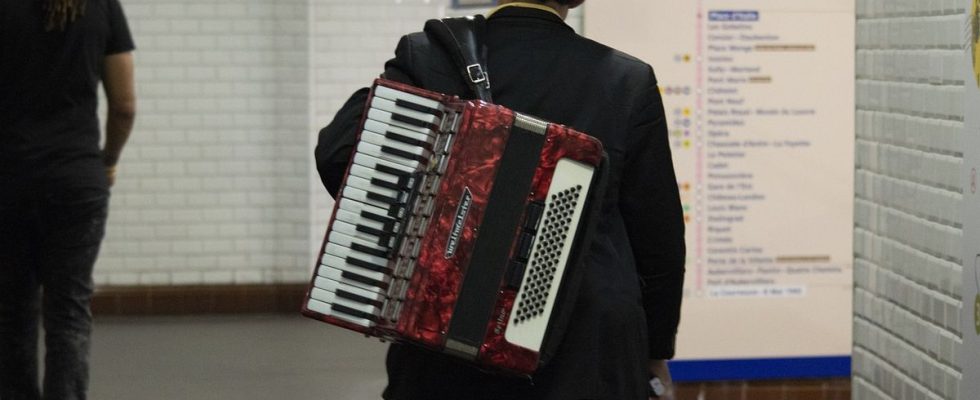This week, the RATP organized a new casting call for “Metro Musicians” intended to unearth the talents who will have the honor of performing in the corridors of the Ile-de-France network. Because yes, these artists are accredited by the transport authority and their activity is supervised. Among the obligations, that of respecting the spaces reserved for this location is particularly scrutinized.
However, many artists also perform in the trains. Without authorization, these unannounced ambiance artists that users know well most often appear on the most “tourist” lines. And if they give a “so French” side to the tourists’ journeys, most often, they only hear the chorus of exasperation from the travelers. Teaser, 20 minutes went to meet passengers to draw up a list of songs they can no longer listen to. A helping hand to artists to help them renew themselves.
Besame Mucho
“I can’t get enough of this song. » Used to line 6, Annette cannot hide a pout of disgust when talking about this bolero composed in the 1930s. If it has been taken up by dozens of great artists (Aznavour, Piaf, Mouskouri, etc.), it has without has probably been sung millions of times in the Paris metro. “It was a song that I found pretty before, but by hearing it too often and almost always butchered, I can no longer stand it,” adds the thirty-year-old with an almost apologetic smile.
“The problem is that this song is incredibly cutesy,” adds Sidney, who takes this same line every day to go to his office on Boulevard de Grenelle: “It’s not the place, nor the context. When you’re packed like sardines when you come back from a day of work, it’s annoying. »
Little tips for artists: This song has perhaps been cited more by users than it has been played in the history of the metro. It’s time to turn the page.
Padam, Padam…
Quite arbitrarily, we chose this song to represent the repertoire of “La Môme”. Difficult to decide La vie en rose, No, I do not regret anything, Ode to love or Milord. “We must inform the singers that it is not enough to roll the R’s to have the talent of Edith Piaf,” laughs Valentine in line 2. If the line lends itself to the repertoire of the legendary singer (it serves Pigalle and Montmartre), the nightingales of the metro use and abuse the symbolic aspect intended to soften the tourists.
“I love these songs, but firstly, we hear them too much, and secondly, we must not confuse a family celebration with an artistic performance”, comments, more severely, Matthieu on the same line.
Andalusian
Without a doubt the most recent song on this ranking. Very often cited, many users nevertheless confess to appreciating it. Less what is done with it. First, it is very difficult to sing: “There are as many versions as there are singers. And not for the best, Maud despairs, every other time it feels like the guy is strangling. »
Above all, Kendji Girac’s song is one of the ambassadors of “speaker” songs. “It should be purely and simply banned in the metro. We have to search people,” Joseph quips in feigned anger. The grievances of his detractors? Its questionable and abusive use. In addition to the volume, often pushed to the extreme, there is difficulty adjusting the bass and a propensity for sound saturation which leads the most relaxed passengers to bang their heads against the windows. “These “things” are too violent for my brain. Sometimes I want to jump out of the window just when I see someone enter the train with a speaker and a microphone. »
Sorry Kendji, that’s what we call a stray bullet.
The Colegiala
We could not miss this enigma. Written and composed by the Peruvian Walter Leon Aguilar in 1977, this song raises two paradoxes. The first is that it was cited by almost one in two users questioned by 20 minutes while no one was able to name it: “But yes, you know, the one that is always played on the Indian flute,” explains Jean-Christophe to his friend. “It was an advert for coffee I think,” he adds in despair. A quick smartphone search will help the two friends determine La Colegiala. For Mathilde, it is “the song of the Unknowns in the three brothers “. Poor Walter Aguilar.
But apart from the fact that the song remains poorly named despite its notoriety, it is also and above all the most cited… without perhaps ever having been heard in the metro. When we try to find out in which line, by whom and at what time it was played, the witnesses disappear one after the other. “That’s the one that came to mind, but in reality, I don’t remember ever hearing it in the metro,” Salomon bursts out laughing in line 13. Same story. for Julia: “It’s a huge cliché I think. It’s more of a song for the seaside in summer, in a seaside resort. »
As you will have understood, it is not the songs themselves which are most often targeted but their interpretation, the context and their recurrence which are targeted.
The fact remains that although certain irritations may have appeared in the testimonies of users, these metro artists are most often considered to be part of the folklore of a city as touristy as Paris.

